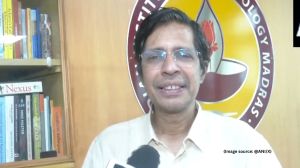Who’s afraid of the VHP
CALL it deja vu of epic proportions. But when an infuriated Ashok Singhal of the Vishwa Hindu Parishad asked for the head of the Prime Minis...

CALL it deja vu of epic proportions. But when an infuriated Ashok Singhal of the Vishwa Hindu Parishad asked for the head of the Prime Minister’s principal secretary Brajesh Mishra at a recent press conference, the script of the unfolding drama began reading like a modern day Mahabharata: a family squabble and a fraternal heartburn fast becoming a full scale war.
The VHP has had nuisance value even in the past. Right before this year’s assembly elections in Uttar Pradesh, the Parishad raked up the Ram Mandir issue by organising the Purna Aahuti Yagya at the Kar Sevak Puram in Ayodhya. When Prime Minister Atal Behari Vajpayee decided to abide by the Supreme Court’s decision in the matter, some VHP cadres openly abused him as a ‘‘traitor.’’ But Singhal’s latest tirade against the Prime Minister’s Office was much more than mere nuisance: It signalled policy interference by a religious leader.
Even VHP’s Marg Darshan Mandal member and BJP MP from Jaunpur, Swami Chinamayanand, finds Singhal’s intervention alarming. ‘‘Regardless of reasons, a head of a religious outfit is dictating public policy to a constitutional body, interfering in an area traditionally considered the exclusive privilege of the Prime Minister,’’ warns the Swami.
This is unprecedented. And even the reported patch-up meeting between the PM and the Sangh leaders seemed to end in the VHP’s advantage: The PM must now consult the BJP’s other Sangh Parivar affiliates, including the RSS and the VHP, before deciding on ‘‘national issues’’. And as a favour, these outfits will refrain from open criticism of the PM. And who can predict how long this truce will last, considering that VHP leaders are already planning the February 2003 Dharma Sansad, when the Ayodhya temple issue will resurface again right before assembly polls in nine states.
The gradual transformation of the VHP from a religious parishad to a ‘political’ organisation has been happening for a while. Be it Jammu or Gujarat, Ayodhya or Delhi, the economic reforms policy or the education policy, a political ally or India’s relationship with Pakistan, the VHP and the other Sangh Parivar outfits have their own political agenda, separate from that of the BJP and the government. In Jammu, the RSS and the VHP combined in the Jammu State Morcha to make the BJP’s strength in the assembly fall from eight seats in 1996 to one in 2002. In Gujarat, the anti-conversion bill — an out and out VHP agenda — will be the principal issue during the forthcoming assembly polls. The Gaurav Yatra of Narendra Modi is scripted, directed and produced by VHP leaders such as Pravin Togadia. (See report from Gujarat).
During the 1980s, the VHP benefited from several issues, including Dalit conversions to Islam in Tamil Nadu’s Meenakshipuram, the Shah Bano case and especially from the Ram Janmabhoomi movement, then egged on ironically by the Rajiv Gandhi-led Congress government. But it was in the 1990s that the BJP, under L K Advani, began riding the crest of the Ram temple movement. The same Congress, in a typically myopic move banned the VHP alongwith the RSS in 1993, which was not approved by the Supreme Court.
The VHP members today claim that since the BJP came to power piggybacking the Ram Mandir agenda, there is no way the BJP cannot implement the temple-rebuilding promise. ‘‘Advaniji benefited greatly from Singhal’s masterminding of the Ram Janmabhoomi Yatra, but today he refrains from defending the movement. He thinks the VHP and the Sangh are expendable. How can the VHP tolerate it?’’ asks one angry VHP member.
The problem is that the new political role of the VHP is not just a distinct ideological position, but overreaches to impose itself on an elected government. The non-elected, non-representative units of the Sangh Parivar today believe in dictating policy decisions, even contesting elections against the party’s candidates. And the discourse of politics has touched new lows: so while VHP cadres call the PM ‘‘a traitor,’’ its second in command, Pravin Togadia, abuses the leader of Opposition, Congress President Sonia Gandhi, as ‘‘an Italian dog’’. Even Chinamayanand is embarrassed. ‘‘Such language does not behove sadhus and sants who should have self-discipline,’’ he says.
The question is why does the BJP tolerates the VHP. ‘‘The BJP fears the VHP more than other Sangh Parivar outfits because the VHP has a very popular mass base,’’ confides a BJP senior leader. Since 1984, the VHP had grown by leaps and bounds in Gujarat, southern Bihar, now Jharkhand, Uttar Pradesh, Jammu and other states. While RSS membership has stagnated, that of the VHP has grown geometrically. In Gujarat, where it is the strongest, the membership has grown over 10 lakhs in the last 15 years.
The upshot is that what was being considered a family squabble the other day is now threatening to develop into a full-fledged power struggle. The previous functional divisions within the Parivar — the BJP as a political party, the VHP as a religious organisation, the RSS as the coordinating body — do not hold good anymore. All of them have political ambitions, and each displays a certain impatience to shape the political agenda of the country.
While the VHP’s political role in the past helped the BJP, today it is hurting the party. In the midst of this crisis, the BJP finds itself in a strange dilemma: If it does not give in to the VHP agenda, it might lose a massive section of the VHP cadre who actively campaign for it. But if it gives in to the VHP, it may sacrifice some of its NDA allies and even lose the middle-class vote.
Photos


- 01
- 02
- 03
- 04
- 05





























